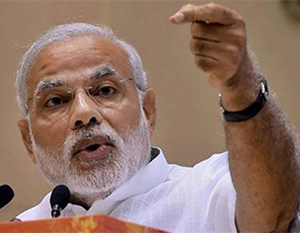Moradabad, Dec 3: Prime Minister Narendra Modi today referred to a WhatsApp video showing a beggar using a swipe machine to persuade people to shift to digital monetary transactions, insisting Indians do not take long to accept new things if they know the intention behind an action is right.
"I don't know how far it is true but there is a video going viral on Whatsapp of a beggar being told by a man that though he wanted to help, he does not have change," Modi told BJP's Parivartan Rally here.
"The beggar asks him not to worry and takes out a swipe machine and asks for his debit card," the Prime Minister said as the crowd burst into peals of laughter.
He said Indians do not take long to accept new things if they are told the intentions are right.
Amidst chants of "Modi-Modi" by the audience, the Prime Minister referred to hundreds of villages which do not have power, even 70 years after Independence.
"People in villages also want to see TV...they also like to see 'saas-bahu' serial but as there is no electricity how can they see it," Modi said, referring to the popular TV show.
The government has said money recovered from those hoarding it post demonetisation exercise would be used for people's welfare like infrastructure development.
Replying to the opposition's charge that farmers have been hit hard by demonetisation and sowing has been affected, he said, "I especially want to thank farmers who despite all problems have not allowed sowing to be affected...it has rather gone up from last time."
"They (opposition parties) are misleading people, creating an atmosphere of pessimism," he said.
Taking a dig at those who have been attacking him over the move, he said, "Some people have lost glow on their faces... earlier they used to chant money-money, now they are chanting Modi-Modi."















Comments
So Indian public is far behind than the beggers .... What a great lose tounge PM.... Jai ho ...
Haaahaa, Mr. PM this is JOKE I received in my FACE BOOK timeline a 5 years back that, a beggar begging with a pedestrian and pedestrian said I am looking for ATM to encash. Immediately the beggar said I have swipe machine sir, you can pay through...
This was a Joke a 5 years back..Modiji may heard this joke just now...
Need treatment for Mr.PM.
'Even Begger uses machine'' Mr Modi do you know that to get machine he has to beg for 6 months ....Most Rubbish prime minister ever with lose Tung
Add new comment